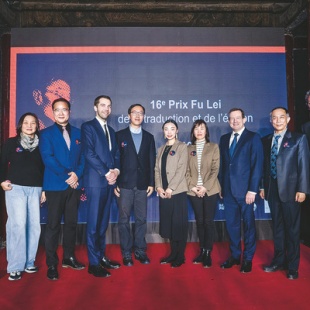Found in translation
Young professionals are increasingly helping to fill in gaps in Chinese versions of French literature, past and present, Fang Aiqing reports.


A younger generation of translators has entered the limelight this year at the Fu Lei Translation and Publishing Award.
The three winners of the 16th edition of the prize, which is sponsored by the French embassy in China, were announced in Beijing on Nov 30. French Ambassador to China Bertrand Lortholary said that the event can also be viewed as part of the wider celebrations of the 60th anniversary of the establishment of China-France diplomatic relations.
Since 2009, the Fu Lei award has been given each year to outstanding translations from French to Chinese, recognizing the efforts of translators, as well as the influence of the translations on Chinese readers. Fu Lei (1908-66), for whom the prize is named, produced Chinese translations of French literary classics by the likes of Balzac, Voltaire, Romain Rolland and Prosper Merimee.
This year, Cao Danhong won the Essay category for her translation of Fact and Fiction: In Defense of a Border by Francoise Lavocat; Shi Xueying won the Literature category for her translation of Aime Cesaire's Notebook of a Return to the Native Land; and the Young Shoots prize was awarded to Dong Ziyun for his translation of The Monarchy of France by Claude de Seyssel.

Yu Zhongxian, a researcher at the Institute of Foreign Literature, Chinese Academy of Social Sciences, and president of the jury this year, said during the award ceremony that while female translators make up the majority of those nominated, the younger generation — born in the 1980s and '90s — also constitute a majority.
He says that the Essay category was devoted to classics of social sciences, sometimes so voluminous that they required collaboration between multiple translators, whereas the literature works nominated focus more on contemporary French social realities and pop culture with innovative themes and a variety of writing styles.




































